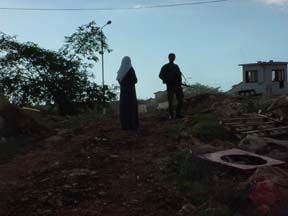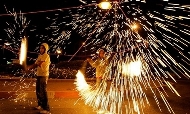On Monday morning three women from IWPS, Kate from the US, Megumi from Japan and Karin from Austria, walked down the settler road between the Palestinian village Hares and the illegal Israeli settlement Revava. We went to meet with a family from the neighbouring village, Deir Istia, who plucked up all their courage to pick their last trees left right under the settlement.

As soon as we were close to the little path leading through the grove, Hassan* came out of the fields with his wife and daughter. With him was the donkey, packed with all the equipment for harvesting the olives. While we were walking towards their field, the family told us about their life and their land behind the settlement.
The family has been living in Yemen for a long time and came back when the situation in the West Bank seemed about to get better, Arafat was back from exile, and the infrustructure was increasing. Although the occupation was still there, they were motivated to finally come back to their homeland where their roots are and hoped that they would soon be living in a free country.
Hassan and his wife Suha* both studied in Lebanon – he is a religious lawyer and she a chemist. Hassan´s family is still living in Deir Istia, where he was raised. Suha´s family left Deir Istia in 1948, and ended up in a refugee camp in Lebanon, where Suha was born and her family still lives. Her parents are not able to come to visit because they are both old. Suha is afraid, that if she goes to Lebanon to see her parents before they die, she will not be allowed to enter again at the Israeli border.
In Deir Istia the young family bought a small house in the picturesque old city, keeping animals and maintaining a little garden within the ancient walls. They live a modest life with their three children – two teenagers and a five year old.
Since they came back to Palestine, five years ago, the situation and the living conditions have been getting worse and worse and it seems as if there is no future on the horizon. Suha is very worried about her children, who become more and more frustrated, especially because they tasted another life, a free life with rights in Yemen.
What remains to them now is their olive trees, which are not only a symbol of their heritage and roots in the country, but also their only income.
They told us sadly that two years ago, the Israeli army imposed curfew on the little village for two days in order to cut and uproot olive trees around Revava. Other families were also affected, but Hassan´s family alone had a loss of around 200 trees on a land of about 50 dunams. Only 25 trees were left and so they asked us to accompany them to the area to pick their olives, because they were afraid that the security guard from the settlement would not allow them to access their land.
Hassan was walking in the front with the donkey and suddenly stiffened, looked straight for quite a while, then slowly turned around and said in a sad and slow voice: “We have no trees anymore. They have cut the rest. We can return home.”
We were shocked and walked into the fields, Hassan remained where he stood and stared into nowhere. There was a lot of brushwood and brambles, uprooted trees, some of them burnt. When we walked up towards the fence a security guard showed up immediately and the nineteen year old Aischa*, the eldest daughter, got frightened, that her father would be shot. Her mother a strong woman, stuted: “This is our land, so we can be here. I don´t care about him. This guard has nothing to say here.”
Karin went with Suha through the thorns to some single little trees which were left and could gather a handful of olives. There were only one to ten olives on each tree. For Suha it was clear: “The trees are sad. They don´t want to carry fruit anymore under these circumstances. Also the soil couldn´t be ploughed and that’s very bad for the trees. But we were afraid coming here. The life of my husband is more important than the trees.”

In the meanwhile Aischa went with Kate and Megumi to the fence of the settlement, which was built on land from Deir Istia, Hares and Qarawat. When the armed guard approached the three women Aischa went towards him and told him: “You killed all our trees”. The guard just said: “Leave from here, please”. When Aischa came back to the two Internationals he shouted to them: “Go away”. Kate replied: “Why should we go away? This is her land”. He demanded: “Show me the papers”. And Kate retorted: “She doesn´t have to show you”. It seems that he understood who was right as he just said ok and went back to the settlement.
We sat down under an olive tree of the neighbour´s groves and the family insisted that we eat some of the sweets they only brought for us, because they assumed that we are not fasting during Ramadan. They told us, that their family who was in Deir Istia when the settlement was built in 1985 fought for their land and trees then. In 1999 they went to the court the last time. They showed us the papers of ownership and from the lawyer as well as maps from their land later when we were in their house.

Now the former olive grove looks like a wild and useless field. That makes it easier for the settlement to expand and build new houses. The strategy seems obvious. If the land gets useless to the farmers because their trees are uprooted and burned, they won´t risk being shot trying to start from the beginning. After three years this gives the Israeli Occupation Forces the legal right to annex it as Israeli property.
Before we went back to their home, we spent some time walking through the sad fields. Around the cut stumps of the ancient trees, which were cut two years ago, wild new branches are growing rampant and stubborn towards the sun as if they wanted to say: “We will resist. Our roots and seeds are deeply in this earth. Whatever you do to us. You can´t wipe us out.”
We hope to accompany the family again to this field to plough the soil and plant new trees.
* Names changed to protection confidentiality.






